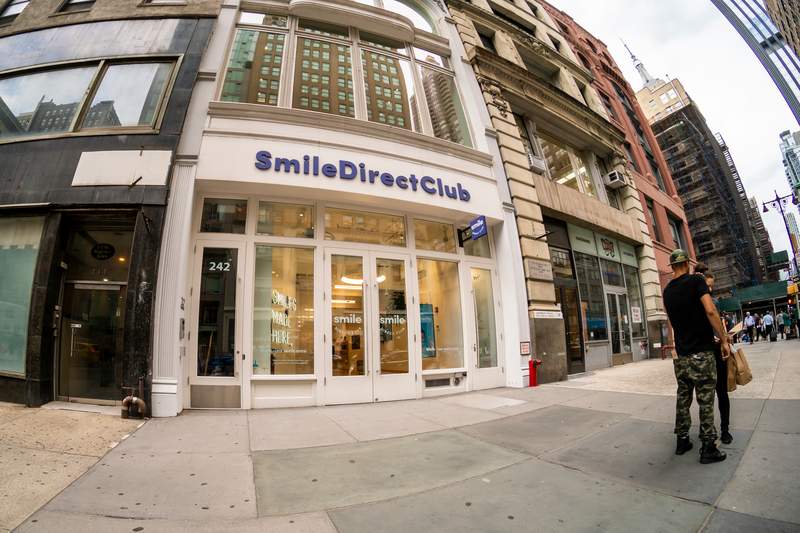By Christiana Sciaudone
Investing.com -- SmileDirectClub's (NASDAQ:SDC) reputation took a hit earlier this year when NBC published a report on users who didn't have a great experience with the company.
Customer experience is a key component of SmileDirect's teledentistry business, as its product aims to improve peoples' smiles. The negative news report should have hurt -- the shares tanked after the report came out on the air and online. But sales rose despite the bad press, and the company expects to turn a profit.
"We remain committed to being profitable this year," said Chief Financial Officer Kyle Wailes in a phone interview. "Expectations are for an annualized growth rate of 20% to 30% for the next five years."
SmileDirectClub sells doctor-prescribed at-home kits of aligners to improve crooked or spaced-out teeth for a better smile. The aligners are printed out at a facility in Tennessee, where the company is headquartered.
The company says it has served more than 1 million people and doesn't get more specific than that. It has identified 500 million people worldwide with the need, and who can afford to pay $89 a month for the product. Of this potential market, 125 million are in the United States.
"It's a massive market opportunity," Wailes said. The U.S. market is the focus, but SmileDirectClub is also positioning itself abroad, and already operates in the U.K., Australia and Hong Kong, among others. Wailes said SmileDirectClub's brand awareness is already at 50%, with one of two people familiar with the brand in the U.S.
It doesn't hurt that SmileDirectClub is now selling oral care products via Walmart (NYSE:WMT), a deal that kicked off early this year. Wailes said the company is eyeing other retailers for similar agreements. SmileDirectClub has also recently begun selling directly to dentists. Wailes said of 200,000 dentists in the U.S., only 30% prescribe clear aligners -- and it's a lucrative deal for the doctors.
Of course, it all depends on people being willing to spend on vanity at a time when so many Americans are unemployed, federal stimulus is elusive, and the outlook uncertain.
Last September, SmileDirectClub debuted as a public company when its shares opened some 11% below the IPO price. They have recovered some, and more than doubled since March. And analysts tend to be fans. The stock has five buy ratings, two holds and no sells.
Like any disruptive company entering a traditional industry, SmileDirectClub hasn't always been welcomed with open arms. It faced lawsuits from orthodontists and consumers, at least some of which have been dismissed. In February, the NBC story cited "dozens" of complaints to the Better Business Bureau regarding treatment and quoted two unhappy former clients.
The distractions didn't seem to deter would-be clients, as revenue for the first quarter increased 11% from a year earlier, to $197 million. That included the first few weeks of Covid-induced lockdowns. The second quarter wasn't as rosy, with sales coming in at $107 million. Like most companies, SmileDirectClub pointed to the pandemic as the main culprit and noted the decrease was driven by a 53% year-over-year drop in aligner shipments.
Earlier this month, Stifel maintained its buy rating on the stock and raised its price target to $14 from $11.
"Despite strong top-line growth and a solid leadership position in an underpenetrated (direct-to-consumer) clear aligner market, our multiple accounts for ongoing lack of profitability and legal / litigation risks that likely remain part of the story in the interim," Stifel analyst Jonathan Block said.
In May, SmileDirectClub sued NBC, seeking $2.8 billion from the company and the reporter for knowingly and intentionally making factually inaccurate, misleading and defamatory claims about the company. An NBC spokesperson said, "We stand by our reporting and believe this is a meritless claim.”
SmileDirectClub said it cannot comment on the ongoing litigation regarding NBC, but Susan Greenspan Rammelt, chief legal officer, said in a statement: “We felt it was necessary to file the suit for the benefit of the millions of consumers who, without teledentistry, would not be able to afford or or obtain quality teeth straightening. We will continue to vigorously defend our company against false claims made by the media and pursue our mission to increase access to premium oral care.”
Other challenges include competition. SmileDirectClub isn't the only game in town; rivals include Invisalign and byte. But Wailes argues that SmileDirectClub has the competitive advantage of doing the entire process, from start to finish, itself. It outsources nothing, and as result can quickly turn around any necessary changes. That also ensures the company can efficiently and rapidly address any customer service issues -- the heart of the business.
"There's no one out there today that controls the entire member experience in the way that we do," Wailes said.
